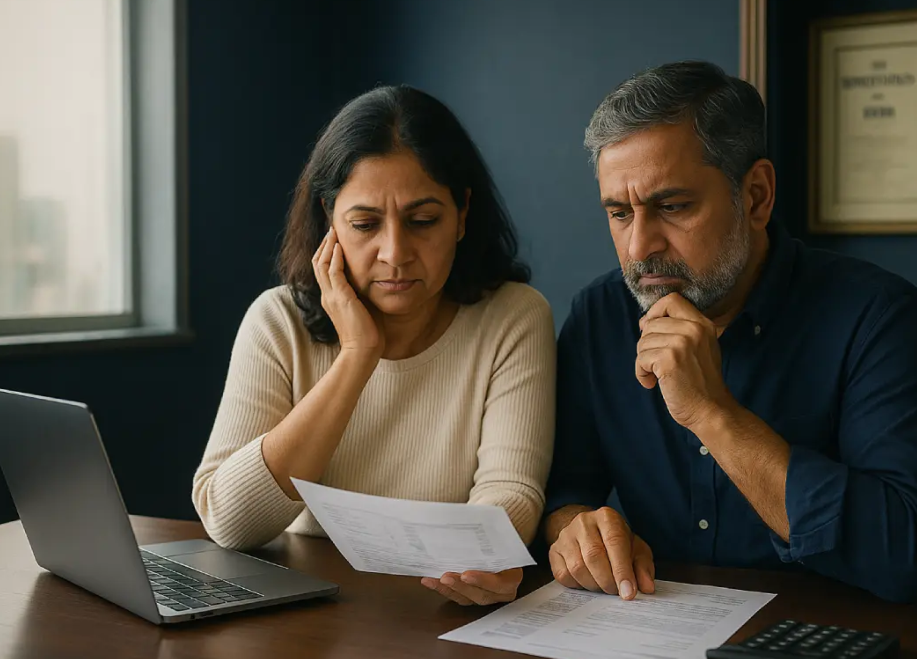Emotional and Legal Checklist to Tick Before Divorce in India
Marriage is till death do us part, but sometimes things don’t work out the way we want or expect. You’re not the only one if you are thinking about divorce in India. Couples find themselves in this painful situation by the thousands each year. But divorce—which, let’s face it, shouldn’t be rushed into—without proper preparation can really compound the agony.
This guide will cover everything you need to do before filing for divorce in India. We also focus on the emotional components that impact your mental health, as well as the legal standards that safeguard your rights. Whether you are contemplating divorce or ready to act, this book will help you proceed wisely.
Why Preparation Matters Before Divorce
Divorce is not a tug of war and everyone gets their share at the end, pulling in all directions so that one person ends up with everything. It touches every aspect of your life — your financial, child care and housing situation, as well as how you are emotionally. In India, it takes a minimum 6 months to several years for a divorce — contested or mutual.
Being prepared helps you:
- Protect your financial interests
- Decide better and helpful for your children
- Reduce emotional trauma
- Speed up the legal process
- Avoid costly mistakes
Here’s what you need to prepare on both fronts.
Check Your Feelings at the Door: Emotional Preparation
Is This Really Your Final Decision?
Before launching through the legal process, you should think about that for a while. You can’t divorce, you can start but it’s hard to pull out of.
Questions to ask yourself:
- Is it possible that we tried couples therapy or counseling?
- Is this a temporary state of affairs or a more permanent problem?
- Are there things about our marriage that can be repaired?
- Is this a decision I’m making in anger, as opposed to based on reason?
In India, many couples hastily throw their marriages into the divorce bin during a bitter argument only to regret it later. Spend at least a few weeks thinking clearly when you’re calm.
Talk to Someone You Trust
It will only be harder to keep everything bottled up inside. Talk about your feelings to people who care about you.
Who can help:
- Other close family members who understand both parties
- Friends who will accept you for who you are
- Professional counselors or therapists
- Divorce support groups
In Indian society, there’s a stigma surrounding divorce. Don’t forget – your mental health is more important than social norms. Your therapist doesn’t need to tell anyone about this, so they can help you unpack and manage whatever is happening with your feelings here.
Warn Your Kids (If You Have Any)
It is the children who get hit the hardest in a divorce. They will be with you a long time and how you handle this makes a difference.
Steps to help your children:
- Share with them as parents (if possible)
- Use simple and truthful words that are suitable for their age
- Reassure them that they are not to blame
- Explain what is going to change, and what is going to stay the same
- Leave communication channels open for their questions and feelings
- Never trash the other parent in their presence
It is the children who are of paramount consideration for Indian family courts. Even if you are furious with your spouse, collaborate to shield your kids from trauma.
Build Your Support System
They’ll provide emotional support as you navigate this journey. Start building it now.
Your support network should include:
- Relatives who are in favor of your choice
- Friends to whom you can turn for tangible assistance
- Mental health professionals
- Possibly a divorce support group
- Spiritual or religious counsel (if that’s your thing)
Those people to call in the dark moments can keep you from making impulsive choices.
Get Financially Independent
For many individuals in India — particularly women — a spouse is often the breadwinner. Try to get yourself financially independent before you divorce.
Steps to take:
- Open up a bank account in your name, at a different bank
- Know what’s coming in and going out of your home finances
- If you are out of work, find a job or gain new skills
- Be sure to have an emergency fund (3-6 months of expenses)
- Find out about your financial rights in divorce
Financial independence empowers you with confidence and choices during your negotiations.
Prepare for Life After Divorce
Consider your practical needs post-separation.
Consider these questions:
- Where will you live?
- How will you support yourself?
- What will you be doing on a day-to-day basis?
- Who will help with childcare?
- What are your new skills to learn?
Planning is what makes you feel most in control about the future.
Legal Checklist: Protecting Your Rights
Know the Applicable Divorce Law for Your Situation
India has various divorce laws for people of different religions. Your rights and basis for divorce are a function of your religion.
| Religion | Applicable Law | Relevant Features |
|---|---|---|
| Hindu, Sikh, Jain, Buddhist | Hindu Marriage Act, 1955 | Requires marriage of one year minimum before filing; various grounds available |
| Muslim | Dissolution of Muslim Marriages Act, 1939 | Different procedure for men and women; including Talaq and Khula |
| Christian | Indian Divorce Act, 1869 | Stricter grounds; adultery treated differently for men and women |
| Parsi | Parsi Marriage and Divorce Act, 1936 | Similar to Hindu Marriage Act with some variations |
| Inter-religious or Special Marriages | Special Marriage Act, 1954 | Uniform ground applicable to all categories (Dissolution of Civil Marriages) |
Knowing which law applies to you is the first step in formulating your case. For more detailed information on family law matters, visit https://zistalegalis.com.
Collect All Important Documents
Good documentation can help make the divorce process easier and ensure that your interests are protected.
Essential documents to gather:
Marriage Proof:
- Marriage certificate (most important)
- Wedding photos
- Wedding invitation cards
- Witness statements
Identity Documents:
- Aadhaar card
- PAN card
- Passport
- Voter ID
- Driving license
Address Proof:
- Utility bills
- Rent agreement
- Property documents
- Bank statements with address
Financial Documents:
- Copies of bank account statements (past 3 years)
- Fixed deposit receipts
- Investment documents
- Property papers
- Salary slips or income proof
- Income tax returns
- Loan documents
- Credit card statements
- Business ownership documents
Child-Related Documents (if applicable):
- Birth certificates
- School records
- Medical records
- Vaccination records
Evidence for Grounds of Divorce:
- Photos, videos and audio (if relevant)
- Medical records (if there is cruelty or abuse)
- Police complaints (if filed)
- Emails, text messages, or letters
- Witness contact information
Make copies of everything. Keep originals and provide copies to your lawyer.
Select the Right Type of Divorce
In India, you can petition for divorce in 2 ways:
Mutual Consent Divorce
The parties have come to an agreement concerning divorce and all related issues.
Advantages:
- Quicker (6 months to 1.5 years at the least)
- Less expensive
- Less stressful
- More privacy
- Better for children
Requirements:
- Both have to agree on child custody terms
- Both must agree on alimony/maintenance
- Both need to be in agreement with property dividing
- You must have been living apart for at least a year
Contested Divorce
One partner files against the other with particular causes.
Grounds under Hindu Marriage Act:
- Adultery
- Cruelty (physical or mental)
- Desertion for 2 years or more
- Conversion to another religion
- Mental disorder or incurable disease
- Communicable disease (like leprosy)
- No news 7 years (believed dead)
- No cohabitation after decree of judicial separation
Process:
- Can take 2-5 years or longer
- More expensive
- Requires proof and evidence
- Court appearances needed
- More emotionally draining
Choose based on your situation. Reaching a mutual deal if at all possible is always preferable.
Find a Good Lawyer
Your best friend in a divorce is a good family law lawyer.
How to choose:
- Search for attorneys who specialize in family law
- Ascertain their experience in cases such as yours
- Check out reviews or solicit recommendations
- Meet 2-3 lawyers before deciding
- Discuss fees clearly upfront
- Pick someone you feel at ease with
Questions to ask your lawyer:
- How many divorces have you worked on?
- How long will my case take?
- What does the process cost overall?
- What’s the best and worst that can happen?
- How would we communicate during the case?
Do not hire the first lawyer you see. Spend the time to find someone who listens to what you want.
Calculate Your Financial Needs
Know exactly what you need money wise prior to negotiations.
Things to calculate:
Immediate Needs:
- Monthly living expenses
- Rent or housing costs
- Children’s education and needs
- Medical expenses
- Transportation
- Food and utilities
Long-term Needs:
- Emergency fund
- Children’s future education
- Your retirement
- Large purchases (house, car)
You might be eligible for these things if you are in India:
- Maintenance (monthly payment from spouse)
- Alimony (one-time settlement)
- Child support
- Share in property
- Stridhan (gifts and ornaments gifted to the wife)
Be realistic, but don’t sell yourself short of what your needs are. Your attorney can assist in determining reasonable amounts using your spouse’s income.
Decide About Children’s Custody
If you have a family, custody is typically the most emotional challenge.
Types of custody in India:
- Physical Custody: The child’s living place
- Legal Custody: Who gets to make the decisions about education, health, religion
Options:
- Sole custody (one parent)
- Joint custody (both parents share)
- Visitation rights for non-custodial parent
Factors courts consider:
- Age of a child (generally the young children will remain with the mother)
- Child’s wishes (if old enough to articulate)
- Each parent’s fitness to care for the child
- Financial stability
- Each parent’s relationship with child
- Child’s routine and stability
- History of abuse or neglect
Courts never prioritize parent’s wishes over child’s best interest. Be ready to demonstrate that you can offer a loving environment.
Protect Your Property Rights
Property splitting can be complex in India.
What you need to know:
Stridhan: Strictly the women’s property. Stridhan is anything that a woman gets from anybody, be it her parents, relatives or friends before marriage or at time of her wedding. This is non-transferable to husband or in-laws.
Community property: Property that is purchased together in marriage should be split 50/50 or based on contribution.
Separate property: Premarital or inheritance is retained by the original owner.
Self-Acquired Property: If a spouse purchases while married, it may be subject to division.
Important: Write down everything you own:
- Real estate (houses, land, shops)
- Bank accounts and fixed deposits
- Vehicles
- Investments (stocks, mutual funds)
- Business interests
- Jewelry and valuable items
- Household items
Hire valuators if necessary. This helps in fair division.
File in the Right Court
You can file for divorce in:
- The town where the wedding occurred
- The court in which you and your spouse last lived together
- The court where you live now (if you have lived there always)
Pick and choose in consultation with your lawyer. You may prefer filing in your present city.
Prepare for Maintenance Claims
Who gets maintenance in India:
Wife: Can claim maintenance from husband despite having income (income is to be considered in amount)
Husband: Entitled to claim from his wife if he has no means of support (new provision, very few cases)
Children: Both parties need to maintain children
Types of maintenance:
- Interim maintenance (during divorce proceedings)
- Permanent alimony (after divorce)
- Child support
Factors affecting maintenance amount:
- Husband’s income and assets
- Income and earning capacity of wife
- Standard of living during marriage
- Duration of marriage
- Age and fitness of both parties
- Children’s needs
Have proof to show your partner’s income if they attempt to conceal it.
Keep Evidence Safe
If you are filing contested divorce then evidence is pivotal.
How to preserve evidence:
- Capture the messages to have a record (with date and time)
- Save emails in multiple places
- Keep recordings legally obtained
- Store documents in cloud storage
- Nothing will be deleted from phone
- Make multiple backups
Warning: Illegally obtained evidence (such as hacking into a spouse’s telephone) may be inadmissible in court and could expose you to legal risk.
Important Legal Points to Remember
Cooling-Off Period
In mutual consent divorce, the 6 month waiting period has been given by the court under which parties have right to dissolve their marriage. This provides a couple of months for couples to think things over. However, this period can now be waived under updated rule changes.
No Fault Divorce
India doesn’t really have “no-fault” divorce. You’re going to have to prove grounds, or obtain mutual consent. Stating flatly that “we’re not compatible” isn’t sufficient for contested divorce.
Irretrievable Breakdown
Irretrievable breakdown of a marriage is also acknowledged as valid grounds for divorce in certain circumstances.
Timing Matters
Hindu Marriage Act says you need to be married for at least one year before filing a petition for divorce, unless there is exceptional hardship or cruelty.
Mediation Option
Mediation is available in many courts today. A neutral party mediates so that couples can come to a mutual agreement without spending time and resources in court battles. It’s private, and it works out most of the time. Learn more about alternative dispute resolution methods for family matters.

Timeline: What to Expect
Here is an approximation of the timeline for various divorce processes in India:
Mutual Consent Divorce
- Preparation: 1-2 months
- Filing first petition: Day 1
- Cooling-off period: 6 months (possible waiver)
- Second motion: After 6 months
- Court hearings: 1-2 hearings
- Final decree: 6-18 months total
Contested Divorce
- Preparation: 2-3 months
- Filing petition: Day 1
- Notice to the spouse: 1-2 months
- Spouse’s reply: 1-2 months
- Evidence stage: 6-12 months
- Multiple hearings: Throughout process
- Arguments and judgment: 2-6 months
- Final decree: 2-5 years (may be longer)
These are estimates. Real time will vary depending on court workloads, complexity of case and cooperation between parties.
Common Mistakes to Avoid
- Concealing assets: The courts can bring the hammer down on you for this one.
- Weaponizing children: This is bad for kids and the attorney who files it.
- Oversharing on social media: Everything you say and do can be used against you.
- Making threats: Never threaten your spouse. This is the kind of thing that can result in criminal cases.
- Emptying joint accounts: Withdraw only your half after speaking with your attorney.
- Not negotiating: Stubborn refusal continues the process, raises expense.
- Failure to comply with court orders: This can lead to contempt of court.
- Signing without reading: Never sign anything that your lawyer has not reviewed.
- Leaving in haste: Moving out impulsively can impact your rights in some cases.
- Arguing about small things: Consider what’s important, which is your future and the welfare of any children.
Special Considerations for Women
Women enjoy certain protections under Indian law:
Domestic Violence Act, 2005: Protection can also be sought without filing for divorce. This act saves women from physical, psychological, sexual and economic exploitation.
Right to Residence: You cannot be kicked out of your marital home without following due legal process, regardless if the house is in your husband’s name.
Maintenance Rights: You could be entitled to maintenance even if you work. Your income will be taken into consideration for maintenance purposes.
Stridhan: Your gifts, jewelry and personal belongings are just yours.
Dowry Harassment: Demands for dowry is a criminal act. Don’t hesitate to report them.
When to Seek Help Immediately
There are some situations that would require immediate police and legal action:
- Physical violence or threats
- Sexual abuse
- Threats to children’s safety
- Being forced out of your home
- Blackmail or extortion
- Threats of suicide or harm
- Destruction of your property
- Dowry harassment
In those cases, file a police complaint first and then reach out to an attorney. Don’t wait.
Cost Considerations
Divorce costs can range widely according to complexity and location:
Mutual Consent Divorce:
- Lawyer fees: ₹15,000 – ₹50,000
- Court fees: ₹500 – ₹2,000
- Documentation: ₹2,000 – ₹5,000
- Total: ₹20,000 – ₹60,000
Contested Divorce:
- Attorney fees: ₹50,000 to ₹5,00,000+ (depends on amount of time taken by the case)
- Court fees: ₹1,000 – ₹5,000
- Expert witnesses: ₹10,000 – ₹50,000
- Private investigators (if needed): ₹20,000+
- Total: May be higher in complicated cases even crossing ₹10,00,000
Free legal aid is provided for those who cannot afford lawyers. You can approach your district legal services authority.
Life After Divorce: Planning Ahead
Divorce isn’t an ending — it’s a launching pad. Start thinking ahead to your post-divorce life:
Practical Steps:
- Update your will and beneficiaries
- Change passwords and bank access
- Update your address everywhere
- Get individual health insurance
- Build your credit history
- Update children’s school records
- Consider changing your name (optional)
- Create a new budget
Emotional Recovery:
- Continue therapy or counseling
- Join support groups
- Take up new hobbies
- Focus on career growth
- Rebuild social connections
- Give yourself time to heal
Remember, there are literally millions of people that have been able to start over and rebuild their lives after divorce. You can too.
Frequently Asked Questions (FAQs)
Q1: If my wife/husband does not grant me a divorce, can I still get one?
Yes, of course you can file contested divorce on the grounds of cruelty, adultery or desertion. But you will have to substantiate your reasons with evidence. The process is more time consuming than mutual consent divorce.
Q2: What is the duration for getting divorce in India?
Consent divorce takes 6-18 months of time. Contested divorce can last 2-5 years but sometimes longer especially if the case is complex or there are backlogs at court. Efforts to reduce the cooling-off periods in recent years have gone some way toward speeding up mutual divorces.
Q3: I am concerned that if I file for divorce, I will lose custody of my kids.
Not necessarily. Custody determination is made based on the best interest of a child, not who filed first. Mothers generally get custody of young children, but fathers can also win custody if they can prove they are the better parent.
Q4: If I’m working, can I receive maintenance?
Yes. Working women are still able to get maintenance in India. But your earnings and what you are able to support yourself on will factor into how much that is. The law acknowledges that you may have adjusted to a lifestyle during marriage.
Q5: What does property acquired during marriage become?
It depends whose name is on it, and who paid for it. Joint property is normally divided 50-50. Even self-acquired property might have to be divided according to each spouse’s contribution. Property purchased before marriage or received as an inheritance typically remains with the original owner.
Q6: Can I prevent my spouse from visitation?
Only if you can demonstrate that your spouse would be harmful to the child. Judges are generally reluctant to deprive a parent of visitation rights altogether. Even if one parent is awarded custody, the other usually gets visitation unless there’s evidence of abuse or neglect.
Q7: What to do if my spouse is not disclosing income?
Your attorney can ask the court to find out. You can provide income tax returns, bank account statements, property records and lifestyle evidence to establish true earnings. Courts have ways to ferret out hidden assets and income.
Q8: Can I remarry if I have a divorce decree?
Yes, you are allowed to get married provided your divorce decree is final. There’s no waiting period for Hindus. Do not lose your divorce certificate as you would require this for re-marriage registration.
Q9: What do I do when my spouse files a false case against me?
Arm yourself with evidence and a good lawyer. False cases of dowry harassment or domestic violence do occur, but courts scrutinize evidence thoroughly. Never ignore the court’s notice; always respond through a lawyer.
Q10: If I change my mind later, can I retract my divorce petition?
Yes, in mutual consent divorce there can be a change and any party may withdraw before second motion. In contested divorce, you can dismiss the petition; however, if the respondent is going ahead with their case, it may continue.
Final Thoughts
Divorce is difficult, but good preparation can help you protect yourself and build a better future. Of course, keep in mind that all of these are only guidelines — no case is the same. As always, seek advice from a competent attorney familiar with your particular situation.
For expert legal guidance and consultation on divorce matters, visit https://zistalegalis.com.
Look after your emotional well-being during this phase. Be easy on yourself, receive the support you need and know that brighter days are to come. Whether you eventually get divorced or focus on saving your marriage, ensure that’s a decision that also offers you peace and safety.
Your happiness matters. Your children’s wellbeing matters. Fear or social pressure should not keep you in an unhappy or unsafe situation. You can get through this difficult time, and with the right preparation and support create a life you are entitled to have.
Disclaimer: This article on divorce in India is only for knowledge purposes. There are differences between religions and laws could change. Be sure to consult with a licensed attorney before taking any legal action.





